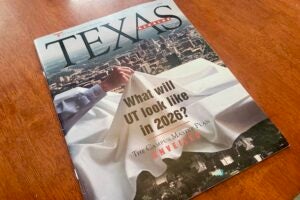AUSTIN, Texas — Thanks to an extraordinary commitment from alumnus and former EOG Resources Inc. President Gary L. Thomas, the Cockrell School of Engineering at The University of Texas at Austin is officially naming its newest building the Gary L. Thomas Energy Engineering Building. Through his investment, Thomas hopes to ensure UT’s position among the nation’s top energy universities while helping to provide a multidisciplinary engineering education for students.
The 184,000-square-foot facility, which is under construction at Speedway and 24th Street on the UT campus, will be a multidisciplinary hub for energy-related education, research and innovation. Thomas, along with UT President Gregory L. Fenves, Cockrell School Dean Sharon L. Wood and a large gathering of supporters and community members, celebrated the building’s official groundbreaking at a ceremony today.
Already home to the nation’s No. 1 ranked petroleum engineering program as well as top-10 ranked programs in chemical and mechanical engineering, according to U.S. News & World Report, UT engineering has been a global leader in energy education and technology development for over a century. In the new Gary L. Thomas Energy Engineering Building, the Cockrell School will provide cutting-edge labs and classrooms, student project spaces and collaborative environments in which students and faculty members in petroleum, chemical and mechanical engineering disciplines can work together to develop the energy industry solutions of the future.
“Gary Thomas has had a remarkable career as a leader in the energy industry, and with this extraordinary gift, he has made a profound investment in future generations of UT engineering students,” said President Fenves. “With the magnificent Energy Engineering Building, Gary is establishing a lasting legacy at UT by helping to ensure that our university remains at the forefront of energy innovation for decades to come.”
Thomas was born in 1949 to parents who were raised during — and heavily influenced by — the Great Depression. His father left school in the sixth grade to work on the family farm before serving in World War II and returning to build a career in the oil and gas industry. His mother was a high school valedictorian who taught her children the value of a good education. Both parents strongly encouraged their children to pursue the college experience that they never had, and Thomas got his first glimpse of his future alma mater when he traveled with his high school basketball team to the state playoffs held at UT’s Gregory Gym. He decided to become a Longhorn after receiving a scholarship to study petroleum engineering at UT.
After graduating with a bachelor’s degree in petroleum engineering in 1972, Thomas held various engineering and production management positions with Unocal and Apache before earning an MBA from the University of Tulsa in 1983. He went on to spend over 40 years with EOG Resources Inc. and its predecessor, and he recently retired from the company as president, a role in which he was responsible for the high profitability and growth of exploration and production activities across the company’s operating areas throughout a diverse portfolio of assets. Since 1999, Thomas helped EOG grow its production from 168,000 to more than 800,000 barrels of oil equivalent per day and its reserves from 600 million to more than 3 billion total barrels of oil equivalent, making it one of the largest independent crude oil and natural gas companies in the U.S.
Recognizing the impact that his UT education has had on his career, Thomas made his investment to help the Cockrell School launch energy leaders and shape future industries.
“I was so fortunate to have been given a scholarship that encouraged me to go to UT, and it felt like the right thing was to return a portion of my good fortune to the university,” Thomas said. “The way students are taught today is quite different than when I was in school — it is so critical to have a multidisciplinary program, and the new Energy Engineering Building will facilitate that. This building will be one of the best of its kind in the country and a great tool for education.”
In addition to his career success, Thomas is also a renowned car enthusiast. He owns one of the nation’s largest known private collections of Ford automobiles, with a focus on Shelby Mustangs. In the future, he plans to auction off a portion of his collection in support of his philanthropic priorities.
Thomas’ commitment, which totals $25 million, caps an extraordinary fundraising effort that has secured over $60 million for the building’s construction, reflecting the excitement that the facility has generated among the Cockrell School’s alumni and friends. Other significant benefactors include the J.C. Anderson Family Foundation, the H.L. Brown Jr. Family Foundation, Peter and Claire Buenz, Jeff and Mindy Hildebrand, the Hoblitzelle Foundation, the estate of William D. Moore, National Oilwell Varco Incorporated, Bryan and Sharoll Sheffield, Scott and Kimberley Sheffield, Eugene and Robin Shepherd, Jeffrey and Valerie Sparks, John and Kelli Weinzierl, and Peyton and Linda Yates.
When completed in fall 2021, the Gary L. Thomas Energy Engineering Building will be located adjacent to the Cockrell School’s 430,000-square-foot Engineering Education and Research Center (EERC), the central space for Cockrell School student groups and resources and home of the Department of Electrical and Computer Engineering. Since its opening in 2017, the EERC has invigorated the Texas Engineering community by breaking down traditional silos and fostering collaborations among the school’s departments, reaffirming the blueprint that also guided the design and construction of the new energy building.
“We have seen the EERC bring our community together like never before — encouraging community members to share ideas and collaborate on research in an open, inviting space that feels like a home away from home for students,” said Cockrell School Dean Wood. “Thanks to Gary and the many other supporters who have invested in the Gary L. Thomas Energy Engineering Building, we can now apply our vision to a new energy hub that will bring some of the world’s best and brightest minds together under one roof in an effort to overcome the energy challenges of tomorrow.”




